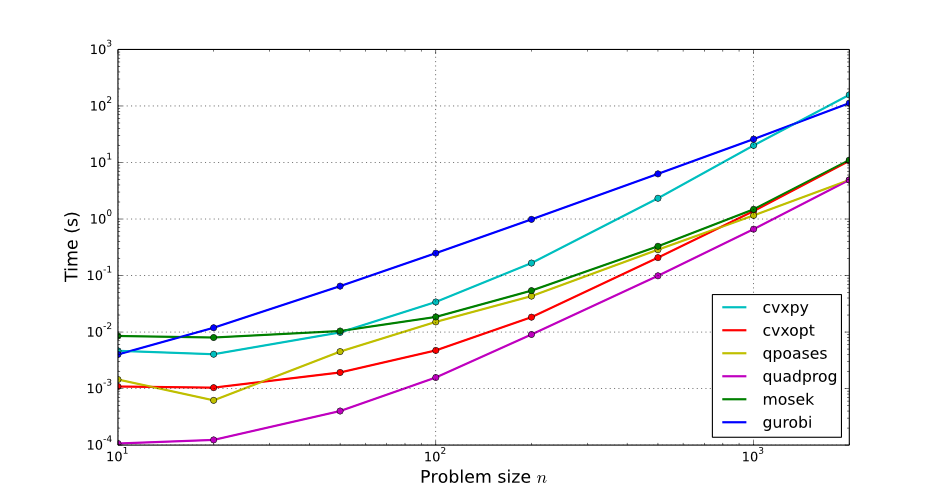Wrapper around Quadratic Programming (QP) solvers in Python, with a unified interface.
The simplest way to install this module is:
pip install qpsolvers
You can add the --user parameter for a user-only installation. See also the
wiki page for
advanced installation instructions.
The function solve_qp(P, q, G, h, A, b) is called with the solver
keyword argument to select the backend solver. The quadratic program it solves
is, in standard form:
Vector inequalities are taken coordinate by coordinate.
The list of supported solvers currently includes:
To solve a quadratic program, simply build the matrices that define it and call
the solve_qp function:
from numpy import array, dot
from qpsolvers import solve_qp
M = array([[1., 2., 0.], [-8., 3., 2.], [0., 1., 1.]])
P = dot(M.T, M) # quick way to build a symmetric matrix
q = dot(array([3., 2., 3.]), M).reshape((3,))
G = array([[1., 2., 1.], [2., 0., 1.], [-1., 2., -1.]])
h = array([3., 2., -2.]).reshape((3,))
A = array([1., 1., 1.])
b = array([1.])
print "QP solution:", solve_qp(P, q, G, h, A, b)This example outputs the solution [0.30769231, -0.69230769, 1.38461538].
On the dense example above, the performance of all solvers (as measured by
IPython's %timeit on my machine) is:
| Solver | Type | Time (ms) |
|---|---|---|
| quadprog | Dense | 0.02 |
| qpoases | Dense | 0.03 |
| osqp | Sparse | 0.04 |
| cvxopt | Dense | 0.43 |
| gurobi | Sparse | 0.84 |
| ecos | Sparse | 2.61 |
| mosek | Sparse | 7.17 |
Meanwhile, on the sparse.py example, these performances become:
| Solver | Type | Time (ms) |
|---|---|---|
| osqp | Sparse | 1 |
| mosek | Sparse | 17 |
| cvxopt | Dense | 35 |
| gurobi | Sparse | 221 |
| quadprog | Dense | 421 |
| ecos | Sparse | 638 |
| qpoases | Dense | 2210 |
Finally, here are the results on a benchmark of random problems generated with the randomized.py example (each data point corresponds to an average over 10 runs):
Note that performances of QP solvers largely depend on the problem solved. For instance, MOSEK performs an automatic conversion to Second-Order Cone Programming (SOCP) which the documentation advises bypassing for better performance. Similarly, ECOS reformulates from QP to SOCP and works best on small problems.

